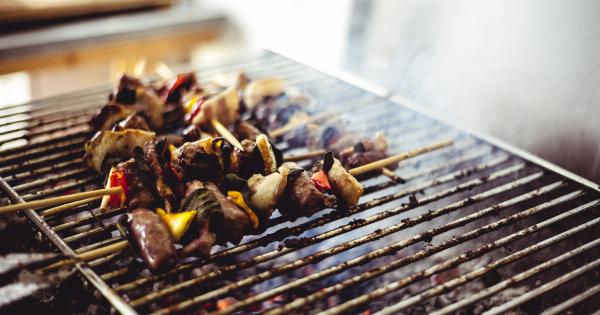Iron is a mineral that your body requires to carry oxygen in your blood. It’s an important nutrient that is essential for your general health and well-being.
Iron deficiency is a problem for many people especially for women, who have an increased risk because of blood loss during menstruation.
What is Iron Deficiency?
Iron deficiency is quite common, it happens when your body doesn’t have enough iron. Your body needs iron to produce hemoglobin, a protein in red blood cells that carries oxygen from your lungs to various organs in your body.
Without iron, your body cannot make enough red blood cells which cause anemia or iron deficiency anemia.
What are the Symptoms of Iron Deficiency?
If you are experiencing any of the following symptoms, you might be iron deficient:.
- Weakness and fatigue
- Pale skin
- Cold hands and feet
- Shortness of breath
- Headaches
- Dizziness or lightheadedness
- Heart palpitations
30 Simple Ways to Boost Iron Levels
: 1. Eat Iron Rich Foods
Eat a diet composed of foods high in iron. This helps to increase the intake of the mineral and improve your health. Foods rich in iron include:.
- Red Meat (beef, lamb and pork)
- Poultry (chicken and turkey)
- Seafood (shrimp and oysters)
- Beans and legumes (lentils, chickpeas, and tofu)
- Nuts and seeds (almonds, cashews, and pumpkin seeds)
- Vegetables (spinach, kale, broccoli, and asparagus)
- Whole grains (brown rice and quinoa)
: 2. Have a Balanced Diet
Eat a well-balanced diet that includes a variety of other foods, too. This will help to keep a healthy weight, head off anemia and keep you feeling full and satisfied all day long.
: 3. Cook in a Cast-Iron Skillet
Cooking in a cast-iron skillet actually adds iron to your food. This can be especially helpful for those who are prone to anemia or who are trying to boost their iron intake.
: 4. Take Iron Supplements
You can get a significant amount of iron from taking iron supplements. This can be helpful if you’re deficient in the mineral as well.
But always consult your doctor before taking the supplement, especially if you have problems absorbing iron from food or have some underlying health issue.
: 5. Cook with Lemon
A natural way to help your body absorb iron from your food is by cooking with lemon juice. Vitamin C helps your body to absorb more iron from food, and lemon is a great source of this nutrient.
A couple teaspoons of fresh lemon juice on a dish can make all the difference.
: 6. Avoid Drinking Too Much Coffee or Tea
Drinking coffee or tea can impede your ability to absorb iron from your food. Tea, especially black tea inhibits the absorption of non-heme iron in plant-based foods, and coffee can hamper absorption of heme iron in animal-based foods.
Avoid drinking too much of caffeine with your meals.
: 7. Cook Beans Properly
Beans can be high in iron, but phytic acid in the beans decreases the absorption of iron. So instead of eating raw beans, cook them properly. This makes it easier for your body to absorb their iron.
: 8. Don’t Drink Milk With Meals
Calcium-containing food, such as milk and cheese can interfere with iron absorption, so avoid drinking milk with meals. It’s best to have milk in between meals as a snack, or choose nondairy sources of calcium like kale, broccoli, and sardines.
: 9. Eat More Liver
Liver is a superfood when it comes to iron, even if it is definitely not everyone’s favorite food. Beef liver, chicken liver and pork liver can pack in loads of iron, adding to your daily dose of the mineral.
: 10. Eat Iron Rich Snacks
Opt for snacks that are high in iron, and you won’t have to feel hungry during your day. Foods that are rich in iron include nuts and seeds, dried fruit (like raisins and apricots) and dark chocolate.
: 11. Add Soybeans to Your Diet
Soybeans are rich in iron, as well as other nutrients like calcium and protein. This makes them a great addition to your diet if you’re looking for more ways to get your iron intake up.
: 12. Avoid Drinking Wine or Alcohol with Meals
Just like caffeine, drinking alcohol with meals can adversely affect the absorption of iron from the food you eat. Avoid drinking wine or alcohol during meals if you’re trying to boost your iron levels.
: 13. Use Iron-enriched Flour
If you eat wheat flour for your bread, try to use iron-enriched flour instead, this can be a nice and simple way to get some extra iron in your diet.
: 14. Add Dried Fruit to Your Diet
Dried fruit like raisins and apricots are good sources of dietary iron. Try adding them to oatmeal, cereal, or snack on them for a quick boost of iron.
: 15. Increase Vitamin C Intake
Eating foods high in vitamin C can improve the absorption of iron in the gut. Fruits and vegetables are rich in this nutrient, and you can eat them with your food or supplements.
Kiwifruit, citrus fruits, strawberries, mango, papaya, melon, spinach, peppers, and tomatoes are all rich in vitamin C.
: 16. Watch Out for Animal Fat
Animal fat can limit iron absorption so try to avoid it. Instead, try cooking with unsaturated fats, like those found in olive oil, sunflower oil and avocado.
: 17. Eat Shellfish
Shellfish, like clams and oysters are not only satisfies your taste buds but also can help to pack in more iron. The good news is that shellfish also offers vitamin B12.
: 18. Avoid Overcooking Your Food
Overcooking vegetables and meats can decrease the amount of iron they contain. Make sure you don’t overcook your foods to maximize your iron intake and nutritional value.
: 19. Try Fermented Food
Fermented foods like kimchi, kefir, and tempeh are good sources of iron as well as other nutrients including probiotics that are good for gut health.
: 20. Eat Chia Seeds
Chia seeds contain minerals and vitamins that your body needs to function properly, including iron. Add them to your oatmeal, smoothies, yogurt or baked goods for an extra boost of iron.
: 21. Eat More Fortified Breakfast Cereals
Fortified breakfast cereals contain added nutrients, and that includes iron. Look for whole grain cereals with high amounts of iron to give you a morning boost.
: 22. Cook with Iron Pots
Cooking with iron pots and pans can help to raise your iron intake. The iron in the pot can seep into the food, and provide more iron to your diet, it’s a pretty simple trick to give you more of the mineral.
: 23. Avoid Eating Foods That Are High in Calcium and Iron
Certain foods are high in both calcium and iron, which can interfere with absorption of either mineral. Some examples of foods rich in both are kale and broccoli. To boost iron absorption, try separating your calcium intake from your iron intake.
: 24. Look for Iron-fortified Flour
Iron is often added to flour to give it more nutritional value. Look for bread made from iron-fortified flour if you want to boost your iron intake.
: 25. Don’t Drink Iced Tea
Iced tea contains compounds that reduce the ability of your body to absorb iron. If you’re looking to increase your iron intake, avoid drinking iced tea with your meals.
: 26. Try More Citrus
Fruits like lemons, limes, and oranges contain high levels of vitamin C, which helps the body absorb more iron. Try adding more citrus to your diet to help your iron levels.
: 27. Avoid Drinking Tea or Coffee with Meals
Caffeine from coffee and tea binds with iron in foods that hinder its absorption. To maximize your iron intake, avoid drinking tea or coffee while you’re eating.
: 28. Snack on Pumpkin Seeds
Pumpkin seeds are high in iron, as well as other essential nutrients like fiber, protein, magnesium, and zinc. Snack on them or add them to salads and soups to boost your iron intake.
: 29. Include Blackstrap Molasses in Your Recipes
Blackstrap molasses is a good source of iron as well as other minerals like calcium, magnesium, and potassium. Try adding it to hot cereals or baked goods for a boost of iron. It has a rich taste that works well in recipes.
: 30. Cook with Turmeric
Turmeric is an excellent source of iron because it contains good amounts of this mineral, but it goes beyond that. It also contains curcumin, a component that helps the body to absorb iron more easily.
Use turmeric in stews, curries, and other recipes instead of salt or other spices for a healthy dose of iron.
Conclusion
Iron is an essential nutrient for your body, and important for the production of hemoglobin and red blood cells. Iron deficiency can cause several health disorders from fatigue, anemia to shortness of breath.
By following these 30 simple tips, you can increase your iron intake, and avoid the problems of iron deficiency. Remember that it’s always best to speak with your doctor before starting any new diet or making changes to your nutrition.






























